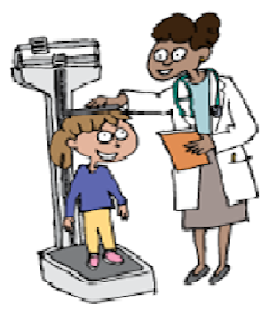Every child is unique and so are his
nutritional needs, which can vary with age.Children, tend to be very
unpredictable, picky eaters during the early childhood phase of growth and
development.It’s no secret — getting your kids
to eat the right foods can be tough,but do you know which nutrients are necessary and in what amounts? So
what's the best formula to fuel your child's growth and development? Here's a quick overview of nutrition for
kids:
Easy Sailing: A
toddler, in contrast, grows at a much slower rate — only 3-5 inches in an
entire year so keep nutrition a top priority than calories. Depending on age, size, and activity level, your toddler needs
between 1,000-1,400 calories a day.
It’s all about balance: Breast milk and formula provided adequate nutrition for your child as an infant, but now it's time for toddlers to start getting what they need through a variety of foods. In planning and preparing food for your toddler, make sure he’s getting a balance of fats, protein, carbohydrates, vitamins, and minerals that can promote growth from the major food groups each day, including:
·
Meat,
poultry, fish, eggs, Pulses
- Dairy products such as milk and cheese
- Cereal grains, rice, potatoes, breads, pasta
- Vegetables and fruits
Stock calcium: An important part of a
toddler’s diet is calcium (they need about 500 mg/day), and the best source of
this nutrient is milk. Until the age of two they should drink whole milk, but
older toddlers can usually switch to skim milk. If your kids are lactose
intolerant or don’t like dairy, incorporate calcium-rich foods like fortified
soy products, cereals, Ragi, and orange juice.
Concentrate on Iron rich foods: Breast-milk has a readily-absorbed type of iron, and baby formula and food is usually iron-fortified, after switching to “real” food, it's important to ensure that your child is eating good sources of iron
To help prevent iron deficiency:
· Limit your child's milk intake to about -2 ½ cups/ day. It only contains low levels of iron.
·
Serve
more iron-rich foods (meat, poultry, fish, enriched grains, beans, tofu).
·
When
serving iron-rich meals, include foods that contain vitamin C (tomatoes,
broccoli, oranges, and strawberries), which improve the body's iron absorption.
·
Keep offering iron-fortified cereal
until your toddler is 2 years old.
Growth during the Preschool Years
Is my child growing the way he or she should be?
As per experts from
finishproblems.com, there is a wide range of "normal" growth. Between
the ages of 2 and 5, the average child grows about 3-5 inches taller each year,
and also gains 2-3 kg each year.
Growth charts are a
good way to monitor your child's growth and health as suggested by
finishproblems.com. Your preschooler's growth
over time is an important sign of good health and nutrition. Your
doctor/Dietician can help you to monitor your child's growth pattern regularly
through growth chart.
How
Many Servings per Day
Serving
sizes and numbers vary with age activity and how fast your child is growing.
The guide below is for a child with normal activity:
|
Food Group
|
Daily Amount for 2-Year-Olds
|
Daily Amount for 3-4Year-Olds
|
Help With Servings
|
Nutrients
|
|
Grains
|
90gms
half from whole-grain sources
|
120-150gms half from whole-grain
sources
|
30gms equals: 1 slice of bread, 1
cup of ready-to-eat cereal, or ½ cup of cooked rice, cooked pasta, or cooked
cereal
|
Carbohydrates
|
|
Vegetables
|
1 cup
|
1½ cups
|
Use measuring cups to check amounts.
Serve veggies that are soft, cut in small pieces, and well cooked to prevent
choking.
|
Fibre,Vitamins& Minerals
|
|
Fruits
|
1 cup
|
1½cup
|
Use measuring cups to check
amounts. An 8- to 9-inch banana equals 1 cup.
|
Fibre,Vitamins& Minerals
|
|
Milk
|
2cups(Whole Milk)
|
21/2 cups
|
One cup equals: 1 cup of milk or
yogurt, 45gms of cottage cheese, or 60gms of processed cheese.
|
Protein, Calcium, Vitamin D
|
|
Meat & Beans
|
60gms
|
90-120gms
|
30gms
Equals: 30gms of meat, poultry or
fish, ¼ cup cooked dry beans, or 1 egg.
Ref. finishproblems.com
|
Protein
|
There are different types of diet charts
suggested for different health problems. We have expert team of dieticians and fitness experts at finish problems who
can help you to get rid of any type of disease through the customized diet
chart and suggested workout. To get free
advice, call 18001031000 or visit www.finishproblems.com


No comments :
Post a Comment